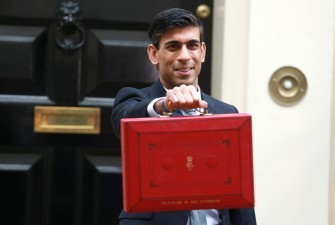
Begbies Traynor Group

01/07/2021
Tapering furlough scheme prompts decision time for pandemic-hit corporates
The coronavirus job retention scheme (CJRS) starts to taper this week, which will prompt employers that receive funding to quantify their long-term workforce size as the UK slowly emerges from its third extended national lockdown.18/06/2021
Moratorium on commercial evictions extended to March 2022
Temporary legislation introduced under the Coronavirus Act 2020 placing a ban on commercial evictions has been extended until 25 March 2022. As the threat posed by the coronavirus pandemic on the commercial property sector fails to subside, the pressure on financially strained tenants is once again lightened.20/05/2021
Momentum builds for a blockbuster UK economic recovery in 2021
The Bank of England (BoE) upgraded its outlook for GDP, seeing a surge this year driven by a successful vaccination roll-out and a fully reopened UK economy in June combined with supportive fiscal and monetary policies and unleashed household savings. Overall, the revised UK forecast implies a faster GDP expansion this year, followed by slower growth next year. As ever, underneath the rosy headline outlook, the environment will remain precarious for some.13/05/2021
Begbies Traynor partners appointed as joint liquidator for Envy Asset Management Trading Ltd
A team from Begbies Traynor Group, led by Darren Reeds and Wesley Edwards, as well as Wong Joo Wan of Alternative Advisors Pte Ltd in Singapore, have been confirmed as joint liquidators of a BVI ent12/05/2021
Macro inventory: US economy’s downside surprise, while ECB hints at asset tapering
Uncertainty obscures the global economic outlook. In the short term, global growth will correlate with the pandemic’s path: from the efficacy of existing vaccines to stem the emergence of possible new Covid-19 variants to the effectiveness of policy action and the varying resilience of different economies to lockdown restrictions. But the long-term effects of the pandemic may take years to become apparent, such as changes in long-term supply and demand across economies and in the evolution of financial markets.15/04/2021
UK exports recover in February as fears over permanent collapse in EU trade recedes
UK exports to the EU climbed by £3.7 billion in February, in a sharp reversal of the downward trend in January which saw a £5.6 billion plunge in the total value of exports to the bloc, newly published data by the Office for National Statistics (ONS) shows.07/04/2021
What is the Government’s Covid-19 Recovery Loan Scheme?
The new Recovery Loan Scheme (RLS) was launched on 6 April 2021 to provide financial support to businesses across the UK as COVID restrictions are lifted and companies once more begin opening their doors to customers and looking to recover and grow following the coronavirus pandemic.22/03/2021
Early year collapse in the UK’s trading volumes with the EU is not a harbinger of things to come
UK goods trading with the EU fell substantially in January. UK goods exports and imports to the EU plunged by £5.6bn (41%) and £6.6bn (29%) respectively, according to the Office for National Statistics (ONS), in the most precipitous monthly decline since records began in 1997.17/03/2021
New Guernsey Office for BTG Global Advisory
BTG Global Advisory founding member, Begbies Traynor Group plc has today completed the acquisition of David Rubin & Partners Limited. This represents the largest acquisition the Group has undertak
16/03/2021
Head Of Begbies Traynor Group Cyprus Office Is Granted Cypriot Insolvency Practitioner Licence
Darren Reeds, head of Begbies Traynor Group’s office in Cyprus has been awarded a Cypriot Insolvency Practitioner Licence. The licence was granted by the Cyprus regulatory body, The Cypriot Insolven10/03/2021
Sunak’s ‘spend big now, tax big later’ Budget
More than 20 million people around the UK have now received a first dose of the Covid-19 vaccine, marking the fourth-highest vaccination rate worldwide. The UK government aims to extend coverage to everyone over 50 or at risk by 15 April and all adults by 31 July. It paves the way for Prime Minister Boris Johnson’s new four-step “roadmap” to ease England’s lockdown.03/03/2021
Chancellor discontinues flagship Bounce Back Loan Scheme amid flurry of new fiscal measures
Chancellor Rishi Sunak announced the dissolution of the UK government’s highly popular Bounce Back Loan Scheme (BBLS) in his Budget this lunchtime, which included £65 billion in new fiscal measures to support the UK’s economic recovery from the pandemic.25/02/2021
Defeating zombification of the UK economy is an urgent challenge
The origin causes of ‘zombie’ firms will maintain pressure on banks, and the government, to exercise a greater fiduciary duty in managing distressed SMEs and corporates. This will skew banks’ preferred strategy towards corporate turnarounds, rather than insolvencies, in the management of defaulted loans.22/02/2021
19/02/2021
VAT Reverse Charge: Assessing the impact on cash flow
Having already been delayed twice, the VAT reverse charge will finally come into force for those within the building and construction sector on 1 March 2021. This will see the way in which some companies operating within the industry change the way they handle, invoice and pay VAT.Find an Expert
Find the right professional using the below dropdowns. Our reach covers the globe with a network of over 300 offices.
Or, browse by location












